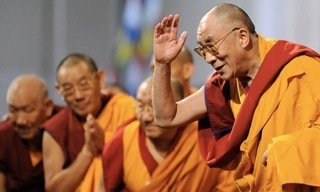Lisa Napoli's Blog, page 42
June 22, 2011
Deciphering prayer flags: On the winds of prayer from Kuensel
What colours
According to Lopon Pema Gyeltshen, one should know the colour of prayer flags when planning to hoist one as they carry great significance.
White – to clear your path from barchey (obstacles)
Yellow –to earn merit
Red – to curb the power of enemies. For example, in wars or even when facing an opponent at an archery match
Green – to ward off envy and jealousy
Blue – if something you planned, like business, is not going according to plan
The five colours also symbolize the five elements – blue-wind, white-water, red-fire, green-space and yellow-earth.








Fellowship for writers in southeast Asia
Jane Camens of the Asia-Pacific Writing Partnership just sent this along:
"Yesterday it was announced here in Britain that a generous NEW £10,000 Fellowship has been established at the University of East Anglia for South Asian creative writers (novelists/poets) in English who are LIVING IN South Asia.
PLEASE will you forward this link to writers you know living in South Asia who might be interested in this generous initiative.
Please click on this link for more information:
http://apwriters.org/general/new-charles-pick-fellowship-for-writers-from-south-asia/
Please be sure to read the webpage above before directing enquiries to charlespickfellowship








Of course the Dalai Lama's a Marxist
A wise essay from The Guardian (can you imagine this running in the US press?)
The Dalai Lama reminds us of Buddhism's radical social and economic messages.
Photograph: Jonathan Ernst/Reuters
I hope you'll read the whole thing, but here's a snip for you:
"…..the Dalai Lama is not the comforting Oriental pet that consumer society might like.
Neither does his tradition match the capitalist fantasies attached to it. Perhaps because Buddhism came to the west on a wave of post-war hippy soul-searching, and was then co-opted as friendly religion of choice by new ageism and the self-help movement, its radical economic and social messages have been lost under an avalanche of laughing fat-man statues, healing crystals and copies of The Secret.
The very idea of self-help in Buddhism is an oxymoron – relief of suffering can only come from the realisation that pleasing ourselves doesn't bring happiness – instead we must try to work skilfully and compassionately with others, as part of interwoven systems of connectivity that bind us together. A "western Buddhism" that prioritises solipsistic focus on the individual is so great a misconception as to be unworthy of the name – or at the least the Buddhism part – as anyone who pays it more than passing attention knows. It's also largely a media invention – many western Buddhists are serious, deeply committed practitioners. That commitment means choosing to follow a path that leads against the stream of materialism and selfishness. Of course, we don't always manage it, but that's why it's called a path of practice.
Buddhism goes way beyond the confines of the personal – realising the truth of interdependence implies taking up the challenge of engaging with others in the wider world. This isn't missionary zeal – proselytising is hardly the Buddhist way – but it does mean social action that embodies dharmic principles, and western sanghas are increasingly prioritising community involvement. As they do so, Buddhism may start to look less like some nice bit of calm and relaxation and more like a radical, uncompromising critique of the status quo."
http://www.guardian.co.uk/commentisfree/belief/2011/jun/20/dalai-lama-marxist-buddhism








@TiffanyShlain and Connected: An Autobiography about Love, Death and Technology
Watch the trailer. Wow! And while I'm not big on awards, since they're so arbitrary, I'll add that it just won the audience award at the Maui Film Festival. Can't wait to see it: 








Good Karma's Emadatse (for non-Bhutanese)
Here's Karma's recipe for Emadatse, slightly adapted for the non-Bhutanese palate. (If you want to hire Karma to cook some Bhutanese food for you, I'll send you her number.)
Good Karma's Taste of Bhutan
Emadatse
(Americanized version)
(feeds one Bhutanese; five non-spice fans)
Ingredients
Chillies – about 10 pieces (serano, jalapeno, bell peppers – these all can be used depending on the level of hotness one wants to have)
Cheese – Monterey Jack shredded – 1 cup (some like it cheesier so you can add half cup or more depending on how cheesey you want it)
Olive oil or butter – (2 T. olive oil or 1/2 stick of butter- butter helps to tone down some of the spiciness of the chillies)
Salt to taste
Optional additions to absorb the heat:
Potatoes (5 small, very thinly sliced – makes this recipe kewa-datse)
Mushrooms (10 of any kind; chanterelles are common in the summer around Bhutan but are pricey here)
1 medium onion – julienned
2 medium tomatoes – chopped in bite size pieces
3 garlic pieces – not the whole clove – it would make it too garlicky
Instructions:
Warm the oil or butter. Turn heat down to low.
Chop the chillies, add the grated cheese, salt, and any optional items you desire.
Stir for 10-15 minutes, depending on how "al dente" you like veggies. Serve over heaping plates of white or pink Bhutanese rice.
Sake or Soju is as close as you'll get to Bhutanese rice wine, ara. Or have a beer to cut the heat!
NOTE: DO NOT put chillies in boiling water – it enhances the spiciness of the chillies – also it will blanch green chillies. Always put chillies in cold water to cook if you do not want them to be spicy.
Traditional emadatse is just the chillies and cheese.








June 21, 2011
Sharisse's emadatse
From Nashville, reader and new friend Sharisse writes: "I made a full Bhutanese dinner tonight. My husband and I watched your videos while we ate. He was almost in tears he loved it so much – even if his hair was wet with sweat from the heat!!! He said, "thank god you read that book". I admit that I snuck in a tiny potato, some onion and mushrooms to tame it down.  "
"
I can send you my friend Good Karma's recipe, too, if you'd like, but you can't blame me if you don't get the same response!








Chemical happiness and a distressing statistic
One in ten adults in Europe pops anti-depressants, according to this story that looks at (yet another) study of depression and finds those in their late forties to be in the worst mental health:

EXCERPT:
5.5million adults in the UK were on anti-depressants at some point last year.
Middle-aged women who were unemployed, divorced or separated were the most likely to pop the pills.
Co-author Andrew Oswald of the University of Warwick, said: 'As we live in the richest and safest era in the history of humans, perhaps we are going to have to ask ourselves why one in ten of Europe's middle-aged citizens need a pill to cope with life.
'That is an awful lot of people relying on chemical happiness.'
The scientists said that the results supported the hypothesis that most of us experience well-being in life as a U-shape. So we start and end our lives relatively content but become bogged down by stresses and strains at work and home leading to a mid-life crisis.
Professor Oswald told the MailOnline: 'It may be that when you are young you begin happily optimistic but with impossible aspirations.
'So you aim to win Wimbledon or perhaps to make enough money to live in Wimbledon.
'Yet once out there in the world, by your middle-age you discover how tough things are. You face failures and have to retract some of their ambitions, which is painful.
'You then enter a midlife low but eventually, by your late 40s and early 50s, you learn to relinquish some of their dreams.
'By facing up to and accepting their imperfections, you gradually can begin to become happier into their 60s and beyond.'








If you're in or around @SanJose and want to hear more about GNH:
The Pursuit of
Gross National Happiness:
Bhutan and a Vision for a Better World
Friday, July 15, 2011 @ 7:00 pm
San José Peace and Justice Center
48 South 7th Street
San José, CA 95112
The term GNH was coined in 1972 by the King of Bhutan to provide a far different measure of
human success than GNP. This talk will provide a photo slideshow of the Himalayan nation, a
presentation and critique of Bhutan's GNH indicators of success, and a vision for a better world.
Richard Hobbs is the Executive Director of Human Agenda, a human rights
organization in San José that works to envision and embody the world we would like
to see. In January Richard made a presentation on the vision of Human Agenda to
the Gross National Happiness Commission of Bhutan in Thimphu. Richard is an
immigration attorney, activist, and former community college trustee, and former
director of the Office of Human Relations of Santa Clara County.
All welcome. Donation $5 – $10
Sponsored by the San Jose Peace and Justice Center and Human Agenda
Info: 408-297-2299 http://www.sanjosepeace.org








The pursuit of happiness: What the founders meant–and didn't
After having the pleasure of visiting our City Council here today in LA, I found this article particularly interesting. Kathleen Kennedy Townsend writes in The Atlantic about the psychic benefits of civic engagement:.
Excerpt:
George Washington and Thomas Jefferson had nice houses. They could have enjoyed contented private lives. But it was not just about their property. They believed that you attained happiness, not merely through the goods you accumulated, or in your private life, but through the good that you did in public. People were happy when they controlled their destiny, when their voice was heard, when they participated in public events, when the government did not do things to them, or even for them, but with them.
The American revolutionaries wanted to have their voice heard and to participate in government. After all, their slogan was not "No taxation"–which is such a popular rallying cry today–but "No taxation without representation." Representation was critical to happiness. The Founders' long recitation of grievances set out the numerous ways in which they couldn't control their destiny. They were subject to England, while they wished to be citizens of America. As citizens, they were able to take control of their government and create a just state where the rule of law was respected, domestic tranquility assured, and defense maintained.
As political animals, human beings need a city, a nation, in which to flourish. People can develop their talents only in society. The good society nurtures many talents, and the political system makes that possible by what it rewards and encourages.




















